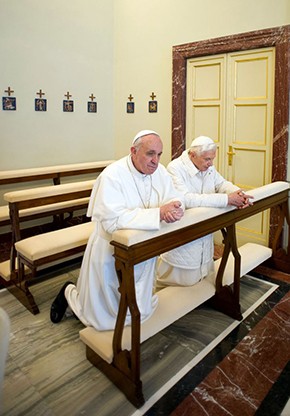Revolutionary continuity

Back in January, few would have imagined that the 40 days of Lent and the 50 days of Easter 2013 would be the opening of a new chapter in the history of the papacy. First Pope Benedict, in the most Benedictine act of his career, retreated like Benedict of Nursia exchanging the commotions of Rome for the austere serenity of a nearby cave. Then a Jesuit from Argentina appeared on the balcony in the guise of a pilgrim greeting other pilgrims, shying away from the pomp of his new role and accepting his election in the spirit of a Franciscan being sent to some far-off mission post.
One pope retired from office, the other pope retired in office, and for the first time in history the world saw two popes embrace. The meeting of these two popes, characterized in the media as “potentially problematic,” was in fact dramatically unproblematic. Whatever awkwardness they may have felt, the mutual deference they demonstrated in praying side by side as brothers eclipsed any thought of intrigue or rivalry between them.
The easiest way to put our minds around the extraordinary series of events that have been unfolding since then is to think in terms of revolutionary change. The words St. Francis heard spoken by Jesus, “Francis, rebuild my church,” echoed in many minds when the pope’s choice of a name was announced; and as the world learned more about Pope Francis’s simple way of life, his devotion to the poorest of the poor and his resolve “to avoid the spiritual sickness of a self-referential church,” we knew we were in for an exhilarating ride. Witnessing the tears of joy as Pope Francis embraces disabled children and adults, the babies passed through the crowds for a papal kiss, the blunt and joyful homilies, the modest lodgings, the arresting humility with which he washed the feet of young prisoners, Christian and Muslim, female and male, I am reminded of Walter de la Mare’s portrait of the Francis-loving G. K. Chesterton: “Knight of the Holy Ghost, he goes his way, / Wisdom his motley, / Truth his loving jest; / The mills of Satan keep his lance in play, / Pity and innocence his heart at rest.”




